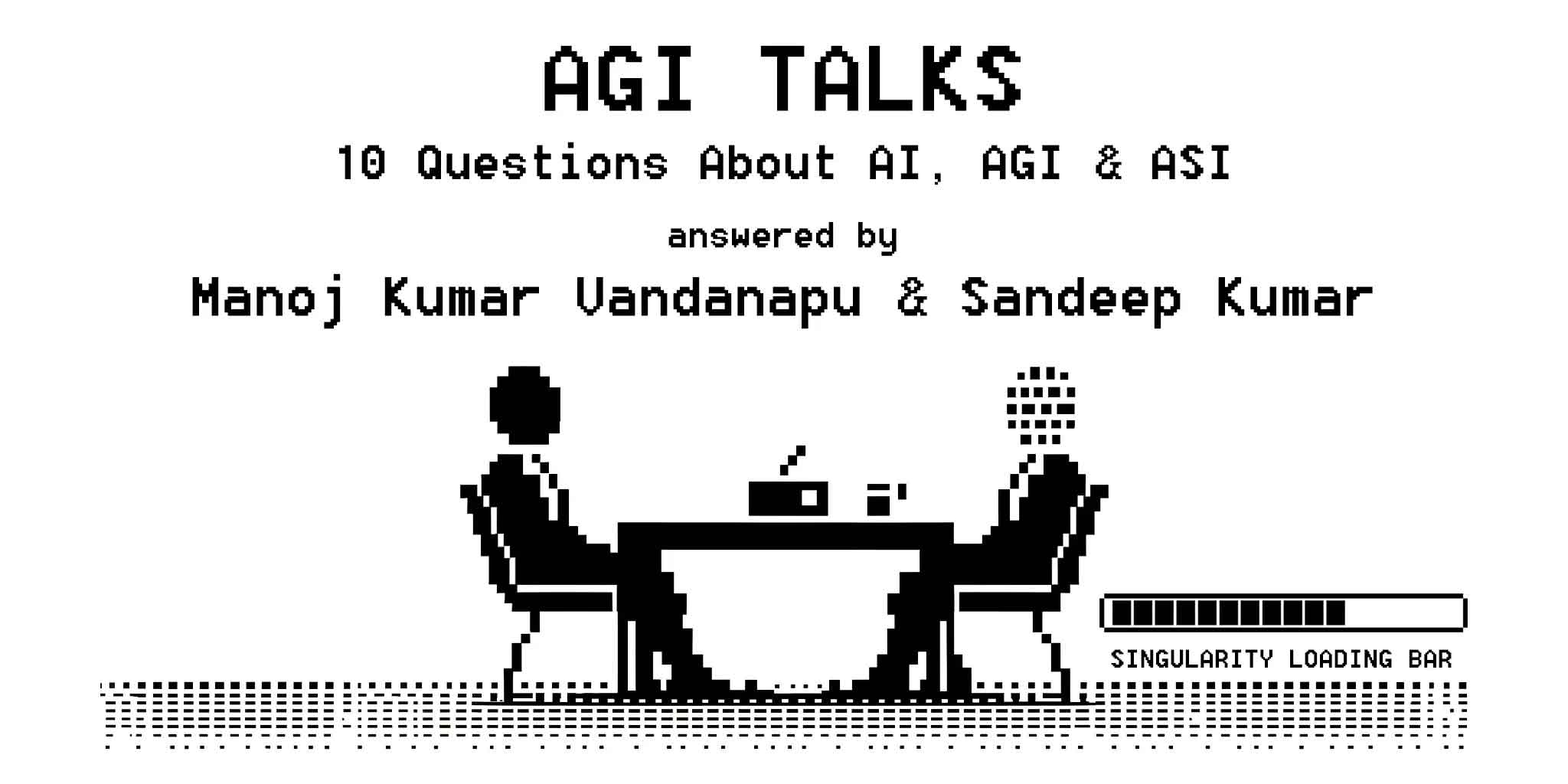AI will automize many routine tasks in accounting and the role of financial controllers and analysts will change, but not be replaced – say Manoj Kumar Vandanapu and Sandeep Kumar.

In the latest AGI Talks, two renowned finance experts share their insights by answering 10 questions about Artificial Intelligence (AI) and Artificial General Intelligence (AGI).
About Manoj Kumar Vandanapu & Sandeep Kumar
Manoj Kumar Vandanapu and Sandeep Kumar are experienced experts in the fields of finance and controlling.

Manoj, serving as a Corporate Finance Controller for a multinational investment bank and an independent researcher in Illinois, is recognized for integration of finance and technology. With a background in accounting combined with a passion for AI and Machine Learning, Manoj’s career focuses on driving financial practices forward. His leadership in deploying innovative solutions within the investment banking sector has markedly enhanced operational efficiencies and established new industry benchmarks. As a researcher, peer reviewer, and adjudicator, he continues to play a critical role in the evolution of financial technologies, mentoring emerging professionals along the way.

Sandeep is an expert for SAP AI and Data Analytics with over 20+ years of experience. He has served in leadership roles to implement and operate multi-million, multi-year SAP ERP projects, and has utilized broad cross-functional business and technology know-how in the fields of systems architecture, data engineering, AI and analytics.
AGI Talks with Manoj and Sandeep
In our interview, Manoj and Sandeep share insights on AI’s impact on finance and accounting:
1. What is your preferred definition of AGI?
Manoj & Sandeep: From a finance and accounting perspective, AGI can be defined as an AI system that possesses the ability to understand, learn, and apply knowledge across a wide range of financial and accounting tasks at a level of competence comparable to or surpassing that of a human expert. This includes abilities such as conducting financial analysis, making investment decisions, managing risk, and interpreting complex tax and accounting laws autonomously.
2. …and ASI?
ASI refers to a hypothetical AI system that not only matches but significantly surpasses human intelligence across all fields, including finance and accounting. In the finance and accounting domains, super-intelligent AI could potentially revolutionize insight generation in the financial markets, decision making based on financial data, audit processes, and strategic financial planning and forecasting by processing and analyzing data at a scale and speed unattainable by human beings.
3. In what ways do you believe AI will most significantly impact society in the next decade?
In the next decade, AI is poised to significantly impact society by automating routine tasks, enhancing decision-making processes, and personalizing services. In finance and accounting, this could translate into more efficient operations, improved accuracy in financial reporting, and personalized financial advice. However, it may also lead to job displacement for roles that require mundane repetitive tasks like financial reconciliations, data analysis and consolidation, operational reporting and will require a shift/alignment in respective skills to enhance and support AI utilization in the finance domain.
4. What do you think is the biggest benefit associated with AI?
The biggest benefit of AI, particularly in finance and accounting, is its potential to enhance efficiency and accuracy. By automating repetitive and time-consuming tasks, AI can free up human professionals to focus more on strategic and analytical tasks, potentially leading to more insightful financial decisions and innovations.
5. …and the biggest risk of AI?
The biggest risk associated with AI is the potential for exacerbating inequalities and causing job displacement. As artificial intelligence systems become more capable, there is a risk that they could replace a significant number of jobs in finance and accounting, leading to economic and social challenges. However, at the same time, it will also open doors to new opportunities and roles to optimally enhance the design and utilization of AI capabilities. Additionally, the concentration of AI capabilities in the hands of a few could increase wealth and power disparities.
6. In your opinion, will AI have a net positive impact on society?
Whether AI will have a net positive impact on society depends on how its development and deployment is managed. If governed ethically and inclusively, AI has the potential to contribute positively by driving economic growth, improving financial services, and enhancing productivity. However, addressing the challenges of equity, privacy, and employment in the initial stage will be crucial.
7. Where are the limits of human control over AI systems?
The limits of human control over AI systems are defined by the complexity of a systems and the unpredictability of their learning processes. As AI systems, particularly those based on GenAI, evolve based on their interactions and data inputs, ensuring they adhere to human values and ethics becomes increasingly challenging, especially for complex and autonomous systems in the field of finance, healthcare, and law of the land.
8. Do you think AI can ever truly understand human values or possess consciousness?
While AI can be programmed to mimic certain aspects of human ethics and decision-making, genuinely comprehending the depth of human values or achieving consciousness involves subjective experiences and emotions that are currently beyond AI's capabilities. However, we are hopeful, it is going to evolve with time.
9. Do you think your jobs as controllers and analysts will ever be replaced by AI?
While AI is set to automate certain aspects of the financial controller's or Advance Analytics role, especially the more routine tasks, it is less likely to replace the role entirely. Instead, AI is expected to transform the role, elevating the importance of strategic oversight, decision-making, and technological proficiency. Financial controllers and Analytics experts will adapt and support changes by acquiring new skills. Learning to leverage AI effectively can enhance their value and remain indispensable to their organizations.
10. We will reach AGI by the year…?
Predicting the timeline for achieving AGI is highly speculative, with estimates ranging from a decade (i.e. 2035) to few more decades. Factors such as breakthroughs in computational power, algorithmic efficiency, and data availability play crucial roles. From a finance and accounting perspective, reaching AGI would mean developing systems that can fully understand and innovate within these domains autonomously, a milestone that is very much possible, but yet uncertain and dependent on numerous technological and ethical considerations.